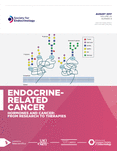WOMEN IN CANCER PROFILE: Dude, where’s my band?
- Genomic Medicine Institute, Lerner Research Institute, Cleveland Clinic, Cleveland, Ohio, USA
- Correspondence should be addressed to A H Ting; Email: tinga{at}ccf.org
Halfway through my third year in college, I still had not decided on a career path. I toyed with the idea of going to law school to become an intellectual property lawyer. I considered undergoing further training to become a genetic counselor. I also attended several career opportunity seminars by notable consulting firms. None of these possibilities really excited me. Coincidentally, I had started attending a superb journal club led by Dr Carl Douglas at the University of British Columbia. By far, it was one of the most enjoyable classes I had taken because we were reading and discussing research studies that were pushing the frontiers of knowledge. The articles did not always provide all the answers to the question(s) the authors set out to address and often raised additional inquiries and fueled further curiosity. I thought to myself, ‘what an adventure it must be to solve the mysteries of life for a living?’
This journal club not only sparked my interest in research but also ignited my curiosity about epigenetics, which are non-sequence altering modifications to chromatin that result in heritable changes in gene expression. The functional genome is the culmination of both the hard-coded DNA sequence and the dynamic epigenetic marks imposed upon it. Understanding aberrant epigenetic modifications in pathological conditions is vital for disease intervention. This spark set off a chain reaction consisting of taking my graduate record examinations (GREs), filling out graduate school applications and interviewing with potential thesis advisors.
I was fortunate to further develop my interest and technical abilities in epigenetics as a graduate student with Dr Stephen Baylin at the Johns Hopkins University School of Medicine. At the time of joining his lab, I indicated to Dr Baylin my desire to test if small RNA molecules could serve as initiators of epigenetic …












